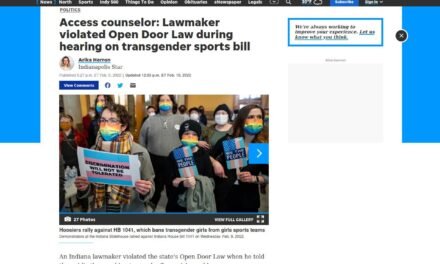By Craig Lyons
Residents in St. Joseph County can dine safely knowing that no one reported a single case of food-borne illness to the county the first four months of the year.
But if there had been a complaint, the public would be able to see only part of the document.
Carolyn Smith, food services director for the St. Joseph County Health Department, said people are told their complaints are anonymous, so the department won’t release the complainants’ names. Smith and officials at some other county health departments cited the federal Health Insurance Portability and Accountability Act (HIPAA) as the reason to either release only part of the food-borne illness complaints or withhold them entirely.
But legal experts say that applying HIPAA to food-borne illness complaints received by county health agencies might be incorrect.
During a project by journalists at The Media School at Indiana University, in partnership with the Indiana Coalition for Open Government, a team of reporters requested various public records, including food-borne illness complaints received in 2015 by 30 county health departments.
Several of the agencies cited HIPAA as a reason to not disclose certain parts or all of the information in those complaints.
HIPAA, a federal law enacted in 2003, applies to health care providers, health plans, public health agencies, insurers and other health organizations that bill or send health information electronically, according to the Reporters Committee for Freedom of the Press.
“We do run into situations where HIPAA is misunderstood,” said Stephen Key, executive director and general counsel for the Hoosier State Press Association.
Although HIPAA was intended to cover medical providers, Key said he’s heard of a situation where a football coach refused to tell a sportswriter if the star quarterback broke his arm because of HIPAA. He said HIPAA doesn’t apply in that circumstance, nor does it apply to a city health agency that handles inspections and complaints about food safety.
If a person decides to make a complaint or submit any petition seeking government action, that is public record, said Indiana’s Public Access Counselor Luke Britt.
Some mayors have hotlines where people can call and leave grievances, complaints about neighbors and other information, Britt said, and under the Access to Public Records Act, that information is public.
“All of those mechanisms, if something’s documented, is public, no matter who makes the complaint,” Britt said. “There’s no expectation of privacy when it comes to making a complaint like that.”
A lot of local governments think there is a right to privacy, Britt said, but there’s really not under the public access laws.
“If you take it upon yourself to make a complaint, then you’re also waiving any kind of privacy,” he said.
Further, Britt said if he went to a restaurant in Marion County, got salmonella and filed a complaint with the health department, the fact he made a complaint doesn’t give away any information about his medical condition, which could be protected health information under HIPAA.
“Just because I made that complaint does not disclose any type of sensitive information,” he said.
Still, it is not uncommon for public agencies to cite HIPAA as a way to deny records in the name of privacy.
Chris Borowieki, director of the Vanderburgh County Health Department Environmental Division, said food-borne illness complaints cannot be disclosed because of HIPAA.
“We never give those out,” he said.
The only information the department releases about food-borne illness complaints is a summary in the annual report, according to Borowieki.
Smith, of the St. Joseph County Health Department, held firm to her procedures when a reporter pointed out that complainant names should be released under APRA.
“If we are not compliant, we have not been compliant for the 19 years that I have been here,” Smith said. “I am not going to change that until my administrator and health officer and board says that we should change that….
“That’s the way we have done it and I don’t know to do it any other way.”
Samim Arif and DeJuan Foster contributed to this story.
This story is part of a project exploring digital access to local government information in Indiana. Click here to return to the main project page.





Recent Comments